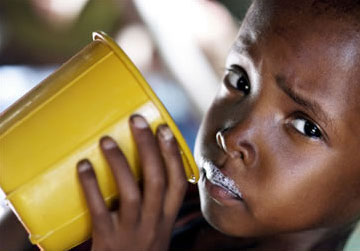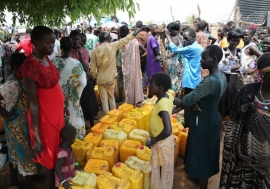Africa in Brief
 An Ethiopian child with a nutrient-rich drink provided by relief agencies.
An Ethiopian child with a nutrient-rich drink provided by relief agencies.Drought, conflict and soaring food prices have left over 14 million people in the Horn of Africa dependent on emergency food aid, and humanitarian agencies report that they are struggling to cope. Ethiopia has been hardest hit, with 10.4 million people needing aid, followed by war-torn Somalia with 2.6 million, and 1.7 million people in Eritrea.
In June the World Food Programme (WFP) reported a shortfall of nearly 39,000 tonnes of food in its Ethiopia programme and noted that some feeding programmes had been interrupted by shortages of basic supplies. The agency estimated it will need an additional $33 mn to continue operations until the end of the year. In Somalia food programmes have been severely hampered by fighting between the government and its allies, including Ethiopia, and rebel forces. Over 800,000 people have fled the capital, Mogadishu, and the number of Somalis in need of food aid is expected to reach 3.5 million by year end. WFP reports it has raised barely half of the $250 mn required for 2008.
International aid appeals come as the troubled region’s governments devote an increasing share of national budgets to defence. At the end of 2007 the Ethiopian government announced a $50 mn increase in its military budget to about $400 mn, citing increased tensions with its neighbours and the cost of its military presence in neighbouring Somalia. “As a result”, Ethiopian President Meles Zenawi told parliament, “we had to build our defence capabilities.”
Africa backs ban on cluster bombs
Thirty-three African states were among the 111 countries to sign the 30 May 2008 Convention on Cluster Munitions that ban the manufacture, sale, use or stockpiling of the weapons. The munitions, dropped by aerial bombs or missiles or fired from artillery, scatter small explosives over a wide area. Unexploded bomblets can linger in conflict zones for months or years and are particularly dangerous to children, who sometimes mistake them for toys or food. The ban was welcomed by UN Secretary-General Ban Ki-moon, who noted that through international cooperation “we can help free communities from the hidden horrors of these weapons.”
According to the non-governmental Cluster Munition Coalition, 14 African armies are currently equipped with the weapons, and must eliminate their stockpiles within eight years. The coalition estimates that the munitions have been used in conflicts in 10 African countries, including Sudan, Chad, Ethiopia, Eritrea and the Democratic Republic of the Congo. The treaty also calls on governments and the international community to aid the victims of cluster munitions attacks.
World Bank business ratings under fire
Ghana and Kenya were among the 10 countries with the most improved regulatory climates in 2007, the World Bank reported in its annual Doing Business survey, produced jointly with the International Finance Corporation (the Bank’s private sector lending arm). The survey rates 178 countries by 10 categories of business regulations.
But the survey’s methods and assumptions have come under fire from the Bank’s own internal watchdog agency, the Independent Evaluation Group. The group says the report reflects an aversion to most types of regulation of businesses, is biased against labour, lacks transparency in its methodology and tends to overstate its findings. It found that seven of the survey’s ten indicators assumed that regulation was always undesirable, “irrespective of the potential benefits.” The survey “measures the costs but not the benefits of regulation,” it noted.
The Doing Business labour criteria, evaluators found, followed the letter of International Labour Organization conventions, “but not always their spirit, insofar as it gives lower scores to countries that have chosen policies for greater job protection.” Its tax criteria, the review said, judged countries’ overall fiscal policies in assigning scores, not just business tax rates. The lack of transparency about its reporting sources and overstated claims about the relevance of its findings have provoked “considerable criticism” from stakeholders, the evaluation concluded, and there appears to be “no statistically significant relationship” between the indicators and economic performance.














